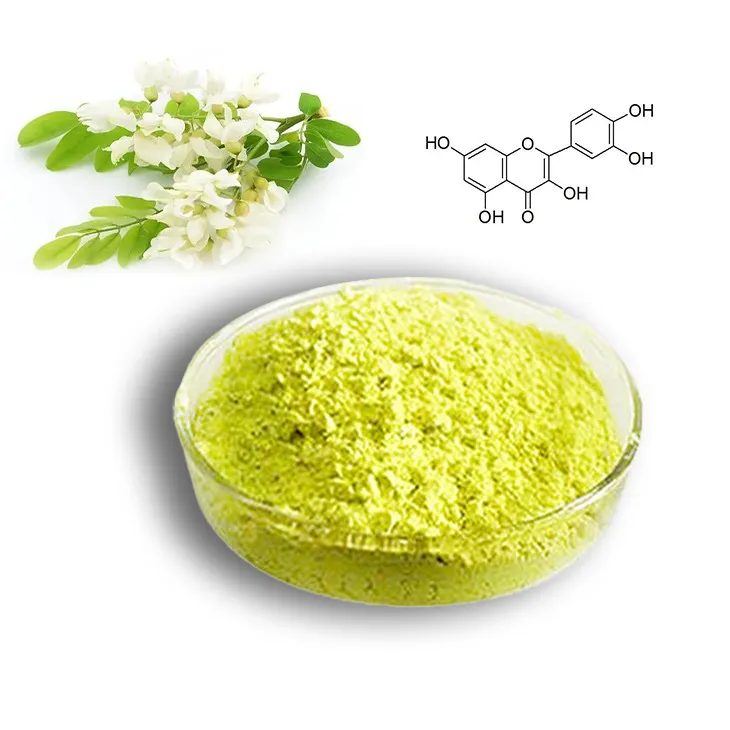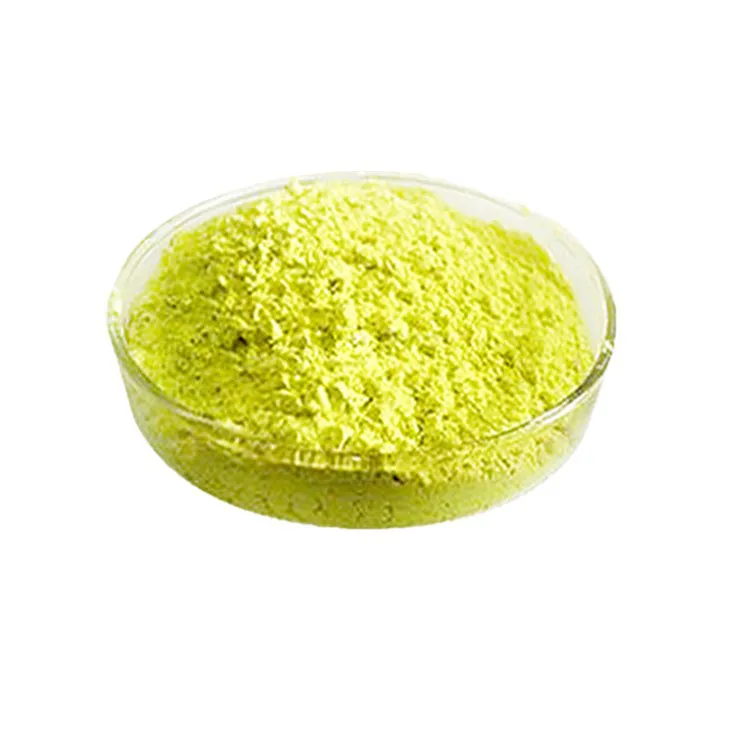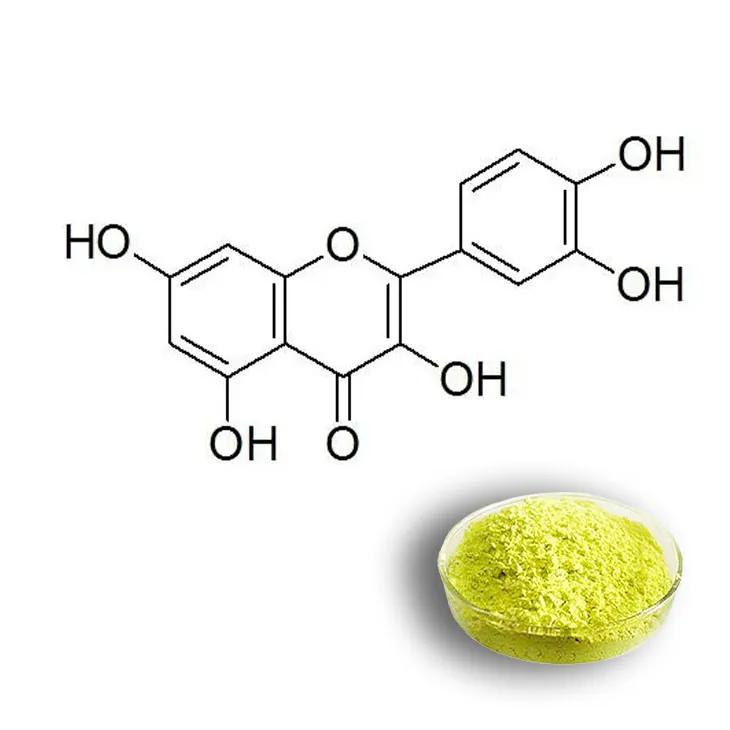- 0086-571-85302990
- sales@greenskybio.com
Pure 85% Quercetin.
2024-12-18

Introduction
Quercetin, at a high purity of 85%, is a remarkable flavonoid that has been garnering significant attention in the field of natural health remedies. Flavonoids are a class of plant - derived compounds known for their diverse biological activities, and Quercetin stands out among them. It is found in a variety of fruits, vegetables, and herbs, but the concentrated 85% pure form offers unique advantages for those interested in harnessing its potential health benefits.

Antioxidant Properties
One of the most important aspects of Quercetin is its antioxidant capabilities. Antioxidants play a crucial role in maintaining health by combating free radicals. Free radicals are highly reactive molecules that can cause damage to cells, DNA, and proteins in the body. This damage is often associated with the development of chronic diseases such as cancer, heart disease, and neurodegenerative disorders.
Quercetin, in its pure 85% form, has been shown to be highly effective in neutralizing free radicals. It does this by donating an electron to the free radical, thereby stabilizing it and preventing it from causing further damage. This antioxidant activity helps to protect the body's cells from oxidative stress, which is a major factor in the aging process and the development of many diseases.
Studies have demonstrated that quercetin can enhance the activity of the body's own antioxidant enzymes, such as superoxide dismutase (SOD) and glutathione peroxidase. These enzymes are part of the body's natural defense system against oxidative stress, and by boosting their activity, quercetin provides an additional layer of protection.

Anti - Inflammatory Effects
Inflammation is a natural response of the body to injury or infection, but chronic inflammation can lead to a host of health problems. Quercetin has significant anti - inflammatory effects that can help to soothe various inflammatory conditions.
It works by inhibiting the production of pro - inflammatory molecules, such as cytokines and prostaglandins. These molecules are involved in the inflammatory response and can cause pain, swelling, and redness. By reducing their production, quercetin can help to alleviate the symptoms of inflammatory conditions such as arthritis, asthma, and inflammatory bowel disease.
Quercetin also has the ability to modulate the immune system. It can help to balance the immune response, preventing it from overreacting and causing excessive inflammation. This immune - modulating effect makes it a valuable compound for those with autoimmune diseases, where the immune system mistakenly attacks the body's own tissues.

Role in Cardiovascular Health
Quercetin may play an important role in cardiovascular health. One of the ways it does this is by improving blood vessel function.
It helps to relax the smooth muscle cells in the blood vessels, which leads to dilation of the vessels. This, in turn, improves blood flow and reduces blood pressure. High blood pressure is a major risk factor for heart disease and stroke, so by helping to regulate blood pressure, quercetin can contribute to better cardiovascular health.
Quercetin also has anti - platelet and anti - clotting properties. It can prevent platelets from sticking together and forming blood clots. Blood clots can block blood vessels, leading to heart attacks and strokes. By inhibiting clot formation, quercetin helps to keep the blood vessels clear and reduce the risk of these cardiovascular events.
Furthermore, quercetin can help to reduce levels of LDL (low - density lipoprotein) cholesterol, also known as "bad" cholesterol. High levels of LDL cholesterol are associated with an increased risk of heart disease. By lowering LDL cholesterol levels, quercetin can further improve cardiovascular health.

Benefits for the Immune System
The immune system is a complex network of cells, tissues, and organs that defends the body against pathogens. Quercetin has several beneficial effects on the immune system.
As mentioned earlier, it can modulate the immune response, preventing it from becoming overactive or underactive. This balance is crucial for maintaining a healthy immune system.
Quercetin also has antimicrobial properties. It can help to fight off bacteria, viruses, and fungi. For example, studies have shown that it can inhibit the growth of certain bacteria, such as Staphylococcus aureus and Escherichia coli. It can also enhance the activity of immune cells, such as macrophages and lymphocytes, which are responsible for engulfing and destroying pathogens.
In addition, quercetin can help to reduce the duration and severity of infections. It does this by supporting the body's natural defense mechanisms and promoting the recovery process.
Potential Anti - Cancer Properties
While more research is needed, there is growing evidence to suggest that quercetin may have anti - cancer properties.
It can act at different stages of cancer development. For example, quercetin has been shown to inhibit the initiation of cancer by preventing DNA damage caused by carcinogens. It can also interfere with the growth and proliferation of cancer cells. This is achieved through various mechanisms, such as inducing cell cycle arrest and promoting apoptosis (programmed cell death) in cancer cells.
Quercetin may also have anti - metastatic properties. Metastasis is the process by which cancer cells spread from the primary tumor to other parts of the body. By inhibiting the ability of cancer cells to migrate and invade other tissues, quercetin could potentially limit the spread of cancer.
However, it is important to note that quercetin should not be considered a substitute for conventional cancer treatments. It may, however, be used as an adjunct therapy to support the effectiveness of traditional cancer treatments such as chemotherapy and radiation therapy.
Other Health Benefits
Quercetin has been associated with several other health benefits.
- It may help to improve cognitive function. Some studies suggest that it can protect the brain from oxidative stress and inflammation, which are factors associated with neurodegenerative diseases such as Alzheimer's and Parkinson's disease.
- Quercetin may also have a role in maintaining healthy skin. It can protect the skin from UV damage, reduce inflammation, and promote collagen synthesis, which is important for maintaining skin elasticity.
- There is evidence to suggest that quercetin can improve exercise performance. It may do this by increasing mitochondrial function, which is responsible for producing energy in cells. This could lead to increased endurance and reduced fatigue during exercise.
How to Incorporate Pure 85% Quercetin into Your Routine
If you are interested in incorporating pure 85% quercetin into your health routine, there are several options.
- Supplements: Quercetin is available in supplement form, which is a convenient way to ensure a consistent intake. However, it is important to choose a high - quality supplement from a reputable manufacturer. Look for products that are third - party tested for purity and potency.
- Dietary Sources: While it may be difficult to obtain the 85% pure form through diet alone, consuming foods rich in quercetin can still provide some of its benefits. Good sources of quercetin include apples, onions, berries, and green tea. Incorporating these foods into your diet on a regular basis can help to increase your quercetin intake.
Precautions and Considerations
While quercetin is generally considered safe for most people, there are some precautions and considerations to keep in mind.
Some people may experience mild side effects such as stomach upset, headache, or allergic reactions. If you experience any adverse effects after taking quercetin, discontinue use and consult a healthcare provider.
Quercetin may interact with certain medications, such as blood thinners and some antibiotics. If you are taking any medications, it is important to talk to your doctor before starting quercetin supplementation.
Also, pregnant and breastfeeding women should exercise caution when using quercetin. While there is limited evidence of harm, more research is needed to determine its safety in these populations.
Conclusion
Pure 85% quercetin is a potent natural compound with a wide range of potential health benefits. Its antioxidant, anti - inflammatory, and other properties make it a valuable addition to a natural health regimen. However, it is important to use it responsibly and be aware of any potential risks or interactions. As with any natural remedy, it should not be used as a substitute for medical advice or treatment, but rather as a complementary approach to maintaining good health.
FAQ:
What is quercetin?
Quercetin is a flavonoid, which is a type of natural compound. It is known for its various health - promoting properties, such as antioxidant and anti - inflammatory effects.
What does the 85% purity in Pure 85% Quercetin" mean?
The 85% purity indicates that in this particular quercetin product, 85% of the content is pure quercetin, while the remaining 15% may be other substances or impurities. A higher purity often implies a more concentrated and potentially more effective form of the compound.
How does quercetin combat free radicals?
Quercetin has antioxidant capabilities. It can donate electrons to free radicals, which are unstable molecules that can cause damage to cells. By doing so, quercetin neutralizes these free radicals, preventing them from causing oxidative stress and potentially reducing the risk of chronic diseases associated with oxidative damage.
What kind of inflammatory conditions can quercetin soothe?
Quercetin can potentially soothe a variety of inflammatory conditions. For example, it may be beneficial for conditions related to joint inflammation like arthritis, as well as inflammation in the digestive tract or respiratory system. However, more research is still needed to fully understand its effectiveness in different types of inflammation.
How does quercetin contribute to cardiovascular health?
Quercetin may contribute to cardiovascular health by improving blood vessel function. It can help relax the blood vessels, which may lead to better blood flow and reduced blood pressure. Additionally, its antioxidant and anti - inflammatory properties may also play a role in preventing the development of atherosclerosis and other cardiovascular diseases.
Related literature
- "The Role of Quercetin in Health and Disease"
- "Quercetin: A Promising Natural Antioxidant for Cardiovascular Health"
- "Anti - Inflammatory Effects of Quercetin: A Review"
- ▶ Hesperidin
- ▶ citrus bioflavonoids
- ▶ plant extract
- ▶ lycopene
- ▶ Diosmin
- ▶ Grape seed extract
- ▶ Sea buckthorn Juice Powder
- ▶ Beetroot powder
- ▶ Hops Extract
- ▶ Artichoke Extract
- ▶ Reishi mushroom extract
- ▶ Astaxanthin
- ▶ Green Tea Extract
- ▶ Curcumin Extract
- ▶ Horse Chestnut Extract
- ▶ Other Problems
- ▶ Boswellia Serrata Extract
- ▶ Resveratrol Extract
- ▶ Marigold Extract
- ▶ Grape Leaf Extract
- ▶ blog3
- ▶ Aminolevulinic acid
- ▶ Cranberry Extract
- ▶ Red Yeast Rice
- ▶ Red Wine Extract
-
Ginseng Root Extract
2024-12-18
-
Epimedium extract powder
2024-12-18
-
Polygonum Cuspidatum Extract
2024-12-18
-
Lemon Juice Powder
2024-12-18
-
Red Date Extract
2024-12-18
-
Bayberry Extract
2024-12-18
-
Cranberry Extract
2024-12-18
-
Green Tea Extract
2024-12-18
-
White Peony Extract
2024-12-18
-
White Willow Bark Extract
2024-12-18





















